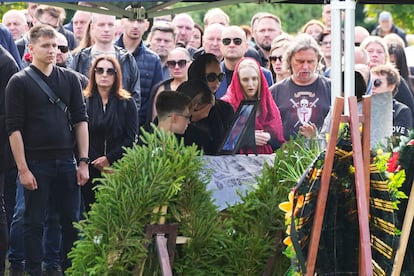Russian mercenary boss Yevgeny Prigozhin is buried in private, ending his tumultuous journey
The Kremlin said earlier that President Vladimir Putin wasn’t planning to attend the funeral

A private funeral has been held for Yevgeny Prigozhin, ending his tumultuous journey from St. Petersburg street thug to Kremlin-financed mercenary leader. His spokespeople said Tuesday the closed service came less than a week after he was killed in a plane crash, two months following his brief mutiny that challenged the authority of President Vladimir Putin.
“Those who wish to bid their farewell” to the 62-year-old mercenary leader should go to the Porokhovskoye cemetery in St. Petersburg, his hometown, according to a terse online statement by his press service.
It wasn’t clear from the statement whether Prigozhin has was buried, but some media cited unidentified sources as saying Prigozhin was laid to rest earlier Tuesday without any publicity, per his family’s wishes.
Prigozhin’s funeral arrangements have been shrouded in secrecy, although Putin’s spokesman said he would not attend the service. The president had decried the armed rebellion in June as “treason” and “a stab in the back.”
The tight secrecy and confusion surrounding the funeral of Prigozhin and his top lieutenants reflected a dilemma faced by the Kremlin amid swirling speculation that the crash was likely a vendetta for his June 23-24 uprising.
While it tried to avoid any pomp-filled ceremony for him, the Kremlin couldn’t afford to denigrate Prigozhin, who reportedly received Russia’s highest award for leading Wagner forces in Ukraine and was idolized by many of the country’s hawks.
Putin’s comments on Prigozhin’s death reflected that careful stand. He noted last week that Wagner leaders “made a significant contribution” to the fighting in Ukraine and described Prigozhin as a “talented businessman” and “a man of difficult fate” who had “made serious mistakes in life.”
Sergei Markov, a pro-Kremlin political analyst, noted that Prigozhin has become a legendary figure for his supporters who are increasingly critical of the authorities.
“Prigozhin’s funeral raises an issue of communication between the bureaucratic Russian government system that doesn’t have much political potential and politically active patriotic segment of the Russian public,” Markov said.
The country’s top criminal investigation agency, the Investigative Committee, officially confirmed Prigozhin’s death on Sunday.
The committee didn’t say what might have caused Prigozhin’s business jet to plummet from the sky on Aug. 23, minutes after taking off from Moscow for St. Petersburg. Just before the crash, Prigozhin had reportedly returned from a trip to Africa, where he sought to expand Wagner Group’s activities.
Also on Tuesday, a funeral was held at St. Petersburg’s Northern Cemetery for Wagner’s logistics chief Valery Chekalov, who was among the 10 people killed in the crash. Prigozhin’s second-in-command, Dmitry Utkin, a retired military intelligence officer who gave the mercenary group its name based on his own nom de guerre, also was killed.
A preliminary U.S. intelligence assessment concluded that an intentional explosion caused the plane to crash, and Western officials have pointed to a long list of Putin’s foes who have been assassinated. The Kremlin rejected Western allegations the president was behind the crash as an “absolute lie.”
Although both were from St. Petersburg, Prigozhin and Putin were not known to be particularly close.
Prigozhin, an ex-convict who earned millions and his nickname “Putin’s chef” from lucrative government catering contracts, served Kremlin political interests and helped expand Russia’s clout by sending his mercenaries to Syria, Libya, the Central African Republic and other countries. Wagner, one of the most capable elements of Moscow’s forces, played a key role in Ukraine, where it captured the Ukrainian eastern stronghold of Bakhmut in late May.
The crash came exactly two months after the brutal and profane mercenary boss launched a rebellion against the Russian military leadership. Prigozhin ordered his mercenaries to take over the military headquarters in the southern city of Rostov-on-Don, and then began a march on Moscow. They downed several military aircraft, killing more than a dozen pilots.
Putin had vowed to punish the participants, but hours later struck a deal that saw Prigozhin ending the mutiny in exchange for amnesty and permission for him and his troops to move to Belarus.
The fate of Wagner, which until recently played a prominent role in Russia’s military campaign in Ukraine and was involved in a number of African and Middle Eastern countries, is uncertain.
Putin said Wagner fighters could sign a contract with the Russian military, move to Belarus or retire from service. Several thousand went to Belarus, where they are in a camp southeast of the capital, Minsk.
Sign up for our weekly newsletter to get more English-language news coverage from EL PAÍS USA Edition
Tu suscripción se está usando en otro dispositivo
¿Quieres añadir otro usuario a tu suscripción?
Si continúas leyendo en este dispositivo, no se podrá leer en el otro.
FlechaTu suscripción se está usando en otro dispositivo y solo puedes acceder a EL PAÍS desde un dispositivo a la vez.
Si quieres compartir tu cuenta, cambia tu suscripción a la modalidad Premium, así podrás añadir otro usuario. Cada uno accederá con su propia cuenta de email, lo que os permitirá personalizar vuestra experiencia en EL PAÍS.
¿Tienes una suscripción de empresa? Accede aquí para contratar más cuentas.
En el caso de no saber quién está usando tu cuenta, te recomendamos cambiar tu contraseña aquí.
Si decides continuar compartiendo tu cuenta, este mensaje se mostrará en tu dispositivo y en el de la otra persona que está usando tu cuenta de forma indefinida, afectando a tu experiencia de lectura. Puedes consultar aquí los términos y condiciones de la suscripción digital.








































